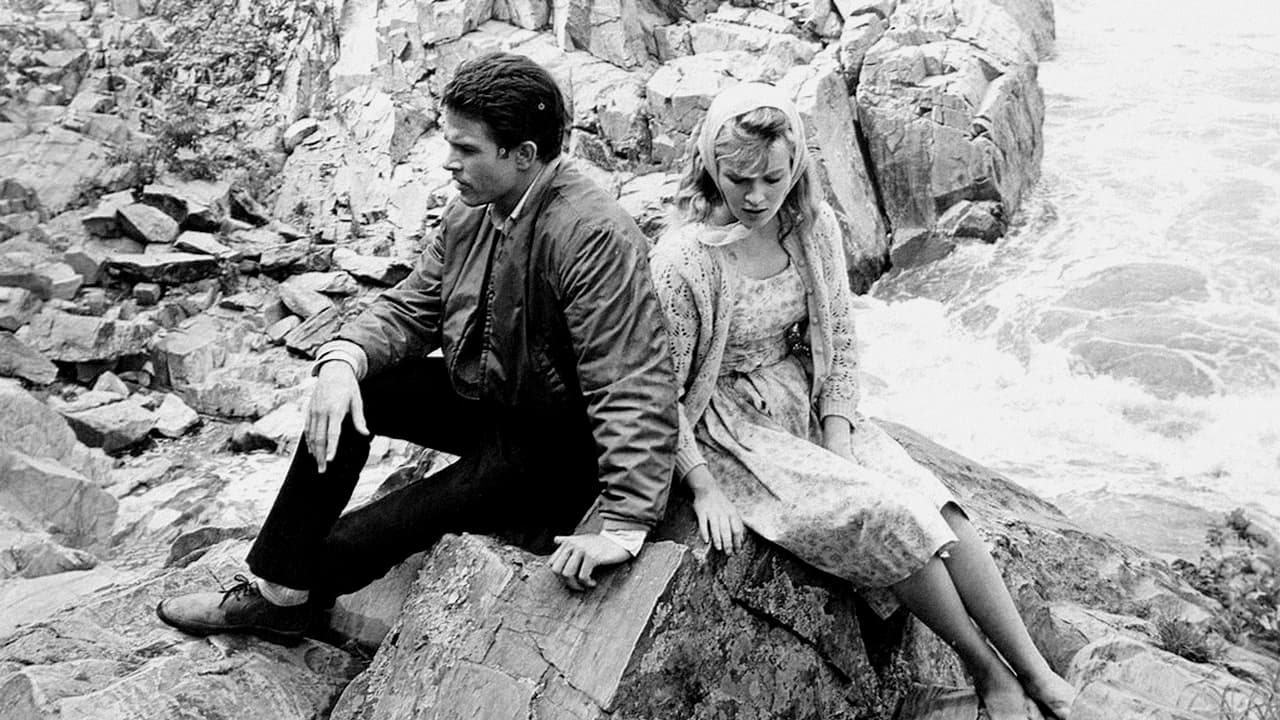

A beautiful sensitive film. Lilith recalls the way insanity was treated in mid 20th century America. The story revolves around a young soldier, possibly going through PTSD, who gets a job as an Occupational Therapist Trainee in a plush Sanitarium recalling the era of Chestnut Lodge and McCleans. Chestnut Lodge was famed for treating patients with psychoanalysis rather than shock treatment. Most of the patients at these hospitals were wealthy, as they are in this film. Their money allowed them to reside at the hospital for long term stays. Today,in-patient treatment of mental illness is dictated by behavioral/cognitive therapy. The hospitals do not allow a patient to be indulged, as they are in this film. Most in-patient treatment of mental illness is provided by general hospitals, and not the resort sanitariums of yesteryear, where Lilith stayed.The agrarian setting is magnificently filmed and gives the movie a surrealist feel, very dreamlike. The pace of the movie is slow and I would not recommend it for fans of action films unless their tastes can embrace the "art house" films of 1960's thru 1970's. This movie brought to mind the great work of Tennessee Williams plays/movies.The movie is basically carried by the acting of Jane Seaberg and Warren Beatty. They are two very attractive, seductive characters who are perfect for the lensing of the film. There were times when I would get tired of Beatty's handsome face and trying to read his non-verbal messages. This was especially true in the scene where he is visiting an old girlfriend and her husband. I found it agonizing to watch the friendly (but rather Rubish) husband trying to engage Beatty into chat.On the whole this is an excellent movie, the likes of which we see little today. I would recommend it for people who loved Suddenly Last Summer, The Roman Spring of Mrs. Stone and Member of the Wedding. As mentioned earlier it also serves as a chapter on the history of medicine, showing how mental illness was treated in 1950's, for those who had the wealth to buy the best and brightest treatment of its time. Right now, I'm going to try to find some other films similar to this and the films mentioned above. I don't think I will have and easy time of it.
... View MoreI read the book many years ago, under the kind of full moon that induces rapport with lunatics. The prose style of J. R. Salamanca's novel was obviously influenced by Vladimir Nabokov's mellifluous "Lolita" but the Warren Beatty character is no Humbert Humbert. He's a dull bulb, well intentioned but capable of being a vicious at times and dragging along a lot of baggage from his childhood. All the poetry, the philosophical originality and twist, is supplied by Jean Seberg, as the schizophrenic Lillith. When in the book she uses a word like "chatelaine", he must ask her what it means.The story is this. Warren Beatty is recently returned from the Army and manages to find a job as an Occupational Therapist at an up-scale psychiatric hospital in Maryland. One of the patients is Jean Seberg. Another is Peter Fonda. The latter is in tentative, shy, but serious love with the former. "She's all I have to live for," he tells Beatty and he means it literally.It doesn't take long for the initially aloof Beatty to be seduced by Jean Seberg. And why should it? She's Hollywood gorgeous, all golden and creamy, and comes on to him when they're alone with a sweetly demonic grin. Beatty's responsibilities involve taking her to picnics and jousts and walks through the woods. In other words, these are paid trysts with Jean Seberg. My kind of job. I've worked in psychiatric hospitals but they must have been the wrong kind.Seberg's self-proclaimed love for Beatty begins to reveal some curious and unexpected aspects, like the scintillating crystals that absorb her attention. For instance, on a public street, she kneels down to chat with two little boys, kisses their fingers, and whispers something shocking into his ear. Beatty yanks her away, half offended and half jealous. He's even MORE jealous when he catches Seberg in a lesbian encounter with another patient. And when she begins to show an interest in the love-stricken and fragile Fonda, he begins to hum with an inner rage. "If you found that your God loved others as much as you, would you hate him?", she asks Beatty, very sensibly, I thought.Beatty deceives Fonda into thinking that Seberg has rejected his gift of an intricately hand-carved cedar pencil box. That's enough for Fonda and he falls on his sword. His death drives Seberg irretrievably mad. The last shot has Beatty approaching his kindly supervisors at the hospital and asking, "Can you help me?" It's an adult, dramatic movie. There is no violence or street language or nudity, although I could have wished for some of the last. But it's very well done by everyone involved. There is no clichéd "crazy music" in the score. Fonda doodles on a flute but nobody practices the scales on a maddening piano. The direction is just fine. Some brief scenes consist of nothing more than two people looking at each other. One makes a remark or asks a question. The other looks back quizzically. Dissolve to the next scene. It's not nearly as dull as it sounds.Warren Beatty does a good job. He ALWAYS does a good job, if never delivering a bravura performance. At the time of release, Pauline Kael's review dismissed Beatty as having the kind of high-school good looks that fade quickly. There are misses -- and then there are MISSES. Forty or so years later Beatty made his last appearance (so far) in a romantic part. Jean Seberg, I don't think we need to go on about. She's hot as hell. And she does fine in suggesting psychosis.But, at that, it's a romantic model of schizophrenia. It's very genteel. Oh, sometimes I guess the guests at this expensive clinic are swept up in a storm of pointless laughter, but nobody takes a dump in the communal sink as sometimes happens in real life. (That's a real example.) Fonda's character is formal and polite. And Seberg has some lines that are unique and enfilade the normal powers of reason.A strong story with competent actors and professionals behind the camera.
... View MoreO. K., very good b. and w. cinematography, and a good acting by Beattty, but no so much of Seberg. She was very good in "Bonjour Tristesse", for instance, but not here. The blame: ¿director?, ¿awful dialogue? Metaphors and symbols are obvious: Seberg playing the flute is an "enchantress", the grid in the window is the "spider web" where Beatty get trapped, Beatty was in love with his mother and Seberg was in love with her brother, the doctor and Kim Hunter are his actual father and mother, the water is the death, the dirty water is the sin (Seberg and the lesbian in the cottage), the ubiquous lesbian woman is the evil, Beatty entering in the woods (first shots of the film) is descending into the hell, Hackman and Harper "are not happy in their marriage", etc., etc. ¿Rossen's remorse by his behaviour in front of the Mc Carthy commission?In any case, ¡too much!
... View MoreThis is one of those films that managed to leave an enduring impression on me and I've seen it quite a few times since finding it quite by chance. It reminds me of that other great unknown the Ninth Configuration. It tells the story of a troubled ex soldier who goes to work at an asylum and quite unexpectedly loses himself in the world of one of the patients - Lilith. Jean Seberg is quite simply out of this world, her every gaze and expression drawing you the viewer in. It's easy to see how both Vincent and another patient Stephen, an introverted young man, are irresistibly attracted to her visions of ecstatic escapism from the unhappy 'real' world outside. Unlike what it says the back of the case, which rather glorifies the trouble she causes and implies a scheming manipulator of men's emotions this is essentially a poetic tale (of course that doesn't sell!). Instead I was left feeling the problems were all caused by others' reaction to her and the neurosis locked up in all of us that she has a talent for bringing out, and healing if they'd but let go of their insecurities. As a man, it left me struggling with both Vincent and Stephens actions as I can see a part of me in both of them. It also left me wishing I was in the story and how I'd do things differently from them. That's the powerful effect of this film. Also worth noting is the connection, never explicitly stated, with the legends of Lilith and the fall of Adam. In this sense you get to hear her side of the story.. quite remarkable
... View More